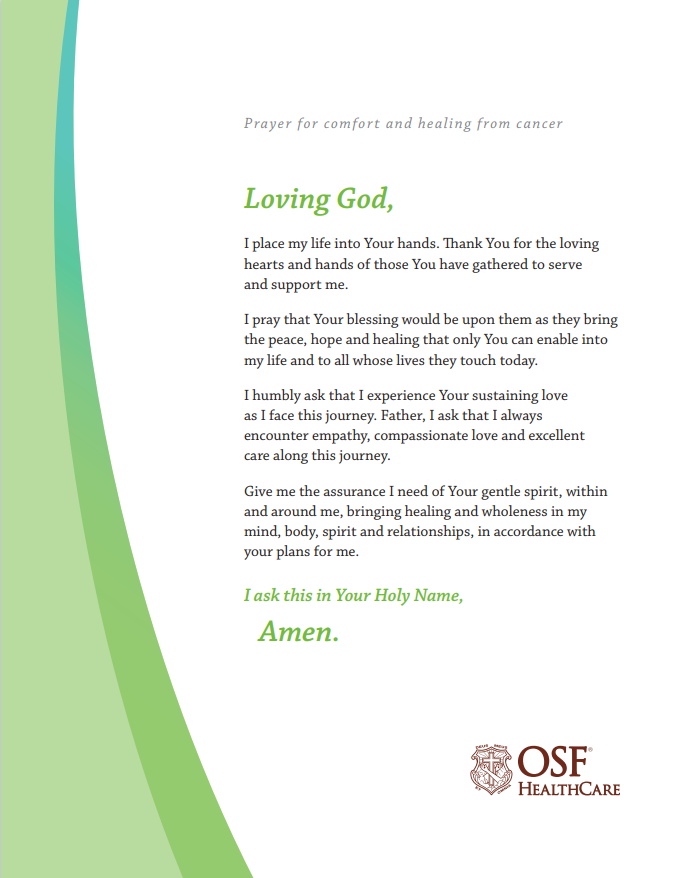One of the hardest decisions to make after a cancer diagnosis is how to share the news.
Do you tell family and friends, or keep it to yourself? How do you tell your family you have cancer? How do you tell other people you have cancer? How much should you tell them? And what about sharing on social media?
Regardless of your decision, it’s important to handle this in a way that makes you feel most comfortable.
Bottom line: “It’s personal,” said Jozie Allen, LCSW, a counselor with OSF Cancer Support Services.
Here are some things to consider when making your decision.
Importance of a support system
Even if you are inclined to keep your cancer diagnosis to yourself, telling the people you live with is a good idea. Once you begin treatment, they will likely notice changes in your appearance and daily routines. They also might need to provide at least minimal assistance.
“The biggest thing is to talk to whoever might be involved with your care, whether it’s for practical, physical or emotional support,” Jozie said. “You don’t want it to surprise them if they suddenly have to step in.
“Who you tell depends on the type of relationship you have with them. Not all of us are fortunate to have a family support system available, so support might need to come from friends or co-workers. But it’s good for someone to know and be there.”
Your primary support person can help you with transportation to and from treatments or pick up groceries or medications. Even if you don’t require help with physical tasks, you might be surprised by how emotional support will help your mental health.
“It can be good to share with family or a close friend. They can divide the weight, so not everything is on your shoulders,” said Alejandro Sanz, MD, a surgeon with OSF Medical Group – General Surgery.
For additional help, you can access online resources provided by organizations like the American Cancer Society and National Cancer Institute, join a support group or consult with a spiritual leader.
Meet somewhere you can talk
The setting in which you deliver the news is also important. If at all possible, you should do this in person. After all, these are the people who are closest to you.
“It’s best to tell loved ones in person if you’re able to,” Jozie said. Setting aside time will help you make the most of the conversation and allow you to answer their questions as best you can. A soft approach helps open up communication.”
Plan what you will say
When you are ready to talk about your cancer diagnosis, Jozie and Dr. Sanz agree that the most important thing you can do is be honest.

Spiritual and mental health are essential.
Click here to download a prayer
“Be honest and factual,” Jozie said. “Provide whatever information you determine is appropriate, but be honest about what’s happening. You don’t have to tell them everything, but don’t minimize the situation.”
Think ahead. Plan what you want to say about your cancer journey and how you want to say it. Try to anticipate questions that might be asked and decide how you will answer them. Write notes for easy reference. Rehearse.
If your close family includes children, take their ages into account and consider framing a special message for them.
“For example, you might tell young children you’re having surgery but not all the details,” Jozie said.
“With adults, how much you tell them depends on your relationship. If they are going to be part of your care, it’s important that they know the facts. So they’ll be able to help you the best they can.”
You also should consider who you’ll tell outside your intimate circle. If you have a job and your cancer treatment will cause you to miss work time, your supervisor will need to know. Co-workers will wonder what’s going on. It’s important to plan what you want and don’t want to say to them.
“An acknowledgment that you have cancer and maybe a general overview of the type of treatment you’ll be having is plenty,” Jozie said.
“If there’s some information you don’t want to share, that’s OK. If you’re faced with questions you don’t want to answer, have a generic response ready – ‘I prefer to keep that information private,’ or ‘I don’t feel comfortable sharing that.’ That way, you know what you’re going to say, and you don’t get caught scrambling. Otherwise, you might share more than you feel comfortable with.”
Posting about your cancer on social media
Nowadays, many people share news of their medical conditions on social media.
“That can be a double-edged sword,” Jozie said.
“It can be stressful and time-consuming to update all of your friends individually. So if you’re comfortable posting on social media, it can be a streamlined way to deliver news and updates. Another benefit is that you are disseminating the news, so everyone gets the same information. It’s not getting distorted.
An alternative to mainstream social media is Caring Bridge, which offers a free online tool to set up a website where you can post health updates. Users can control access to their site.
“In the end, it’s really up to you and what you feel comfortable sharing,” Jozie said.
Using prayer to start the conversation
You can find comfort in your spirituality. Sharing a common prayer with your family before your conversation can bring calm to a stressful situation.
“I also think it’s important to mention the role spirituality plays,” Jozie said. “If you or someone in your family is religious or spiritual, this is a good time to connect. Faith and spirituality can reduce anxiety and bring peace when you are going through something traumatic, making it easier to have difficult conversations.”
Last Updated: February 15, 2023
